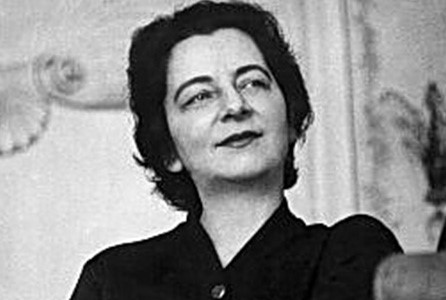
Pologne
Grażyna Bacewicz (1909-1969) was a Polish composer, violinist, and teacher. She is one of the most renowned Polish women composers, having achieved both national and international acclaim, won numerous prizes, and taken many commissions over the course of her career. She studied at the Warsaw Conservatory, then trained further in Paris, notably studying composition under Nadia Boulanger.
A major part of her work is dedicated to orchestral music, chamber music, and strings – particularly the violin, her favoured instrument. She wrote seven violin concertos, and five sonatas for violin and piano. Stylistically, her pre-1950s output has often been described as tied to “neoclassicism” (despite this taxonomy being both vague and debated), with works marked at first by the influence of interwar French music. The music of this period is characterised by a clarity of contrapuntal lines and sounds, and a certain disdain for pathos – yet her music is not without emotion, despite the attention paid to formal rigor. Her famous Concerto pour orchestre à cordes (1948), widely considered one of the highlights of her career, is rather representative of this period.
Her approach evolved over the entire course of her career: open to innovations in writing, mainly those from the European avant-garde, her 1960s aesthetic approach took on several modernist techniques and ideas of the era – most notably serialism, which she used for certain parts of her String Quartet No.6 (another major work), and an increased exploration of sound and timbre as composition parameters.
– Frédérick Duhautpas –
[Traduction en anglais : Raphaël Meyer]
A major part of her work is dedicated to orchestral music, chamber music, and strings – particularly the violin, her favoured instrument. She wrote seven violin concertos, and five sonatas for violin and piano. Stylistically, her pre-1950s output has often been described as tied to “neoclassicism” (despite this taxonomy being both vague and debated), with works marked at first by the influence of interwar French music. The music of this period is characterised by a clarity of contrapuntal lines and sounds, and a certain disdain for pathos – yet her music is not without emotion, despite the attention paid to formal rigor. Her famous Concerto pour orchestre à cordes (1948), widely considered one of the highlights of her career, is rather representative of this period.
Her approach evolved over the entire course of her career: open to innovations in writing, mainly those from the European avant-garde, her 1960s aesthetic approach took on several modernist techniques and ideas of the era – most notably serialism, which she used for certain parts of her String Quartet No.6 (another major work), and an increased exploration of sound and timbre as composition parameters.
– Frédérick Duhautpas –
[Traduction en anglais : Raphaël Meyer]
List of Works
Contributor:
Présence Compositrices - last updated 16 December 2024